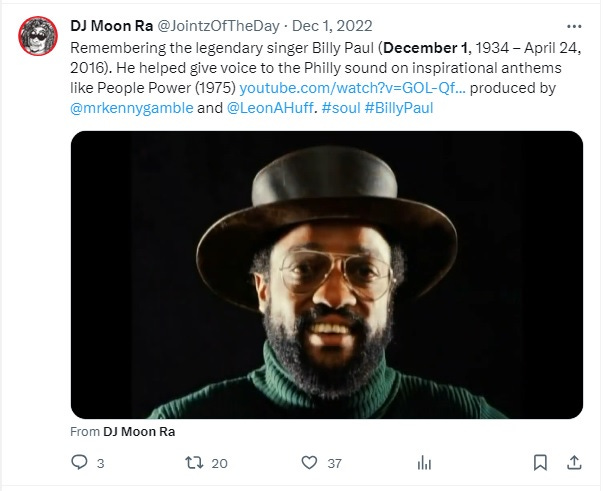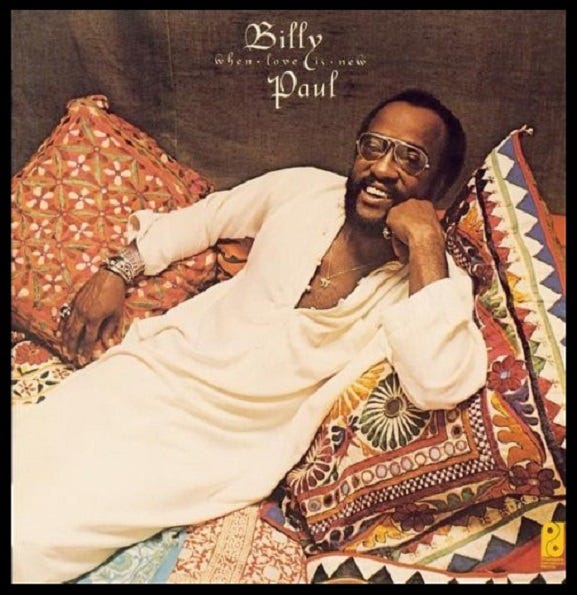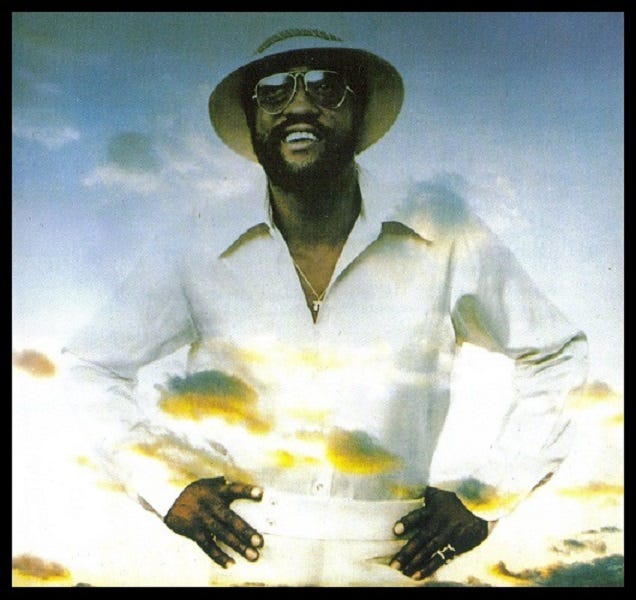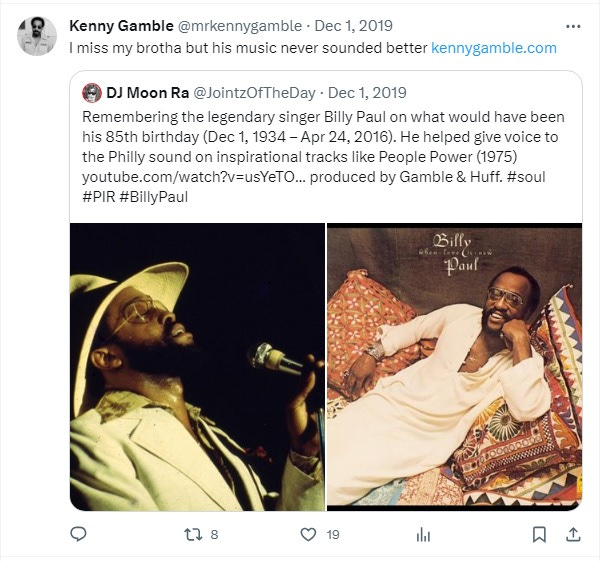Billy Paul (December 1, 1934 – April 24, 2016) – People Power (1975)
This powerful unity anthem from the unsung 70s Philly soul singer was co-written by McFadden and Whitehead and produced by Gamble and Huff.
Watch full video on Twitter.
View most updated version of this post on Substack.
Open YouTube playlist of all songs in this post.
The great singer Billy Paul remains an unsung hero of socially conscious seventies soul, despite the ten albums he released that decade and a 2009 feature documentary about his life. He recorded for Philadelphia International Records and was second only to the mighty O’Jays as a vehicle for the message songs of producers and label owners Kenny Gamble and Leon Huff.
Paul Williams was born in Philadelphia and raised in North Philly. His mother was a music lover and he grew up listening to her large record collection. He was particularly influenced by Nat King Cole, Billie Holiday, Ella Fitzgerald, Nina Simone, and Sam Cooke. Williams began singing at a young age and appeared on local radio station WPEN when he was 11. His mother arranged for him to attend both the West Philadelphia Music School and the Granoff School of Music. At age 16, he was one of the acts opening for Charlie Parker for a week at Philly’s Club Harlem. As he told author Fred Bronson in the early 2000s:
“I was there with him for a week and I learned what it would normally take two years to pick up. Bird told me if I kept struggling I'd go a long way, and I've never forgotten his words.”
Williams’ manager Jules Malvin gave him the stage name Billy Paul in the early fifties when he spent six weeks opening for other acts at the Apollo in Harlem. He recorded his first tracks in 1952, a pair of ballads released on Jubilee Records that did not chart.
He was drafted into the Army in 1957, when he was 23. Stationed in Germany, he formed a band with Bing Crosby’s son Gary called the Jazz Blues Symphony Band, which eventually included Eddie Harris and jazz pianist Cedar Walton. They tried repeatedly to get Elvis to join, but he was content driving a Jeep for higher-ranked officers and turned them down.
After being discharged, in 1959 he released the single “Ebony Woman” b/w with the jazz spiritual “Go to Hell” on the Philly label New Dawn Records, backed by a trio. He was a member of both the Blue Notes and the Flamingos for short periods, and became close friends with Marvin Gaye who was then singing with the Moonglows.
In a 2009 interview, Paul recalled how he first met Kenny Gamble in 1968:
“I was singing in a jazz club called the Sahara. He had a record shop on South Street and Philly – right round the corner and I was singing with a trio at the Sahara club on Friday, Saturday, and Sunday. He came over and said, 'I am starting a record company and I would like to sign you.' I took all the material I sung every weekend and I did an album in three and a half hours – a whole album. I had this album, and I produced it – me and my wife. And we gave him this album called Feelin' Good at the Cadillac Club to help start the record company and that was the album that helped start it up.”
Paul’s debut album was produced by Gamble and his musical partner Leon Huff, and came out on their early label Gamble Records in 1968, but did not chart. His next LP Ebony Woman was released on their new label Neptune Records in 1970, and finally landed Paul on the R&B album charts, peaking at #12.
Songwriter and arranger Bobby Martin wrote the album’s slow jam single “Let's Fall In Love All Over Again,” which did not chart. The album also contained inspired covers of several other artists’ hits, such as “Windy,” originally by the Association.
After Gamble and Huff founded Philadelphia International Records (PIR) in 1971, financially backed and distributed by CBS, they produced another LP for Paul, Going East. Its epic title track was written by Tyrone W. Brown, and Gamble and Huff co-wrote the heartfelt love song “Love Buddies.”
The following year saw the release of Paul’s breakthrough #1 R&B album 360 Degrees of Billy Paul (1972), produced by Gamble and Huff and arranged by Martin. The two producers co-wrote several of its greatest tracks, including the socially conscious opening cut “Brown Baby.”
When the album’s lead single “Me And Mrs. Jones” (co-written by Gamble, Huff, and lyricist Cary Gilbert) was released in September, 1972, it began climbing the charts. By December, it had peaked at #1 R&B, where it stayed for four weeks, and also spent three weeks at #1 on the Billboard Hot 100. It was Paul’s biggest-ever hit, and the first #1 song for Gamble and Huff. Paul won that year’s Grammy for Best Male R&B Vocal Performance.
The song chosen by Gamble to follow it up was the album’s most upbeat jam, the unapologetic Black pride anthem “Am I Black Enough For You?” which was released as the LP’s second single in April, 1973. It was a jarring contrast to the mellow sound of “Me And Mrs. Jones,” and only reached a disappointing #29 R&B and #79 on the Hot 100. For years Paul blamed the song for short-circuiting his career. Its powerful, race-conscious lyrics alienated mainstream white radio DJ’s who were expecting another ballad, and they largely refused to play it. In his 2004 book A House on Fire: The Rise and Fall of Philadelphia Soul, music historian John A. Jackson called the decision “inadvisable” and a “fiasco.”
In a 1973 interview, Paul explained how he felt about its choice as a single:
“Well, I have to be honest. This wasn't the one that I really wanted. But the company felt I had to get over to the black audience this time round. And there can be no arguing about that — the record is one of the top sellers in the black areas and one of the most requested records around the stations. I don't really think anybody expected it to be a pop hit — that's reserved for the next one, which is the one I wanted all along — 'Brown Baby'.”
Unfortunately, due to the commercial failure of “Am I Black Enough For You?,” “Brown Baby” was only released as a single overseas.
Gamble and Huff delivered a psychedelic soul masterpiece with Paul’s next album War of the Gods (1973), even though at #12 on the R&B album charts, sales were well below those of 360 Degrees of Billy Paul. Gamble and Huff co-wrote its stellar, spaced out opening cut “See The Light” with producer/songwriter Bunny Sigler, while solely co-writing its uplifting #9 R&B single “Thanks For Saving My Life,” the socially conscious closing cut “Peace Holy Peace” and the album’s epic ten-minute title track. In a 2012 interview, Paul said “War of the Gods” was his all-time favorite out of his own songs:
“It's very spiritual, and it tells people about war. Me and Marvin Gaye were tight and he did 'What's Going On.' I said to him I have to do my version and I went for it.”
Paul’s next studio album was Get My Head On Straight, released in early 1975. It peaked at #20 on the R&B album charts. Paul co-wrote its masterpiece track “Black Wonders of the World” along with Gamble, Huff, and songwriter/producers John Whitehead and Gene McFadden. It was a Black history sermon along the lines of future uplifting classics by Stevie Wonder (“Black Man”) and Gary Byrd (“The Crown”).
Later that same year came Paul’s seventh studio album, When Love Is New, released in December, 1975. Produced by Gamble and Huff as usual, it was the last of his full-length records to feature the original lineup of MFSB as its backing musicians, PIR’s house band. The core players left the label mid-decade and became the Salsoul Orchestra, backing artists on New York City’s Salsoul Records. Paul co-wrote two songs on the LP, including the stellar message song “Let The Dollar Circulate” which he penned with songwriter Donald Level.
The album’s first single was “Let’s Make A Baby,” written by Gamble and Huff. Released in early 1976, it hit #18 R&B, and was soon targeted by Jesse Jackson as part of his crusade against records with supposedly obscene lyrical content. It was not obscene by any stretch of the imagination, with its most explicit lyric possibly being “Tonight I'm gonna make sweet, sweet love to you.” But its title alone was too suggestive for Jackson, and along with other songs like “Disco Lady” by Johnnie Taylor and “Work On Me” by the O’Jays, he called for radio stations to ban “Let’s Make A Baby.” Chicago’s influential R&B powerhouse WVON actually edited the song for airplay, while other stations played the song in full but refused to announce its title on air.
The controversy mostly hurt the second single released off When Love Is New, the powerful unity anthem “People Power.” This was sadly ironic since lyrically it was a theme song for the progressive political aims of Jackson’s Rainbow Coalition / PUSH (People United to Save Humanity). Co-written by McFadden, Whitehead, and Victor Carstarphen, it peaked at #82 R&B, although it did hit #14 on the dance charts. Its failure to chart higher was at least partially an aftereffect of Jackson’s crusade, and Paul’s future releases also suffered. In 2021, DJ Juan Negron released his superb J*ski Disco Extended mix of “People Power.”
In late 1976, Paul covered Paul McCartney’s hit song “Let ‘Em In,” which had been released earlier that summer. He changed the lyrics to more directly reference slain civil rights leaders Malcolm X, Martin Luther King Jr. and Medgar Evers, John and Bobby Kennedy, and his recently departed twin sister Pauline.
“Pauline Williams, Was my twin / Elijah and Malcolm, Still our friends /
Brother Martin, We can't forget John / Bobby and Medgar, Louis Armstrong!”
It became the title track to his latest album, but unfortunately Paul’s single version only reached #91 R&B.
For the 1977 LP Let’s Clean Up The Ghetto by the Philadelphia International All-Stars, Paul contributed the hopeful message song “New Day, New World Comin’.” He was also featured as one of the lead singers on the album’s powerful title track.
In 2009, Swedish filmmaker Göran Hugo Olsson released the full-length documentary Am I Black Enough For You? on Paul’s life and times. He and his wife Blanche Williams sat for an audience Q&A after its Philadelphia premiere, moderated by Dyana Williams, the famed radio host and co-founder of Black Music Month.
Happy Birthday in Heaven to the legend Billy Paul.
Further info:
“The Age Old Problem Of The Follow Up,” interview, May 1973.
A House on Fire: The Rise and Fall of Philadelphia Soul, by John A. Jackson, Oxford University Press, 2004.
“Billy Paul: Soul Searching,” by Lee Tyler, BluesAndSoul.com, 2009.
“Interview: Billy Paul,” by Cassam Looch, MovieVortex.com, 2012.
“Billy Paul - Am I Black Enough Q&A," moderated by Dyana Williams with Billy Paul and Blanche Williams, ReelBlack, April 2, 2013.
“Billy Paul, Singer of the Hit 'Me and Mrs. Jones,' Dies at 81,” obituary, The New York Times, April 25, 2016.
“Beyond 'Mrs. Jones': Billy Paul's Music You Might Not Have Heard,” NPR, April 25, 2016.
“Me and Billy Paul (We Had a Good Thing Going on),” The Chestnut Hill Local, May 5, 2016.
#soul #funk #Philadelphia #PIR #MFSB #BillyPaul










